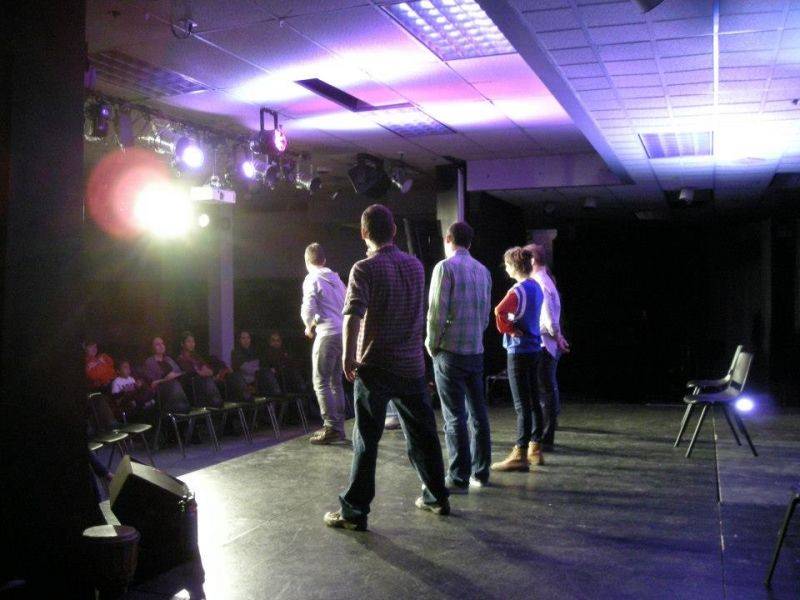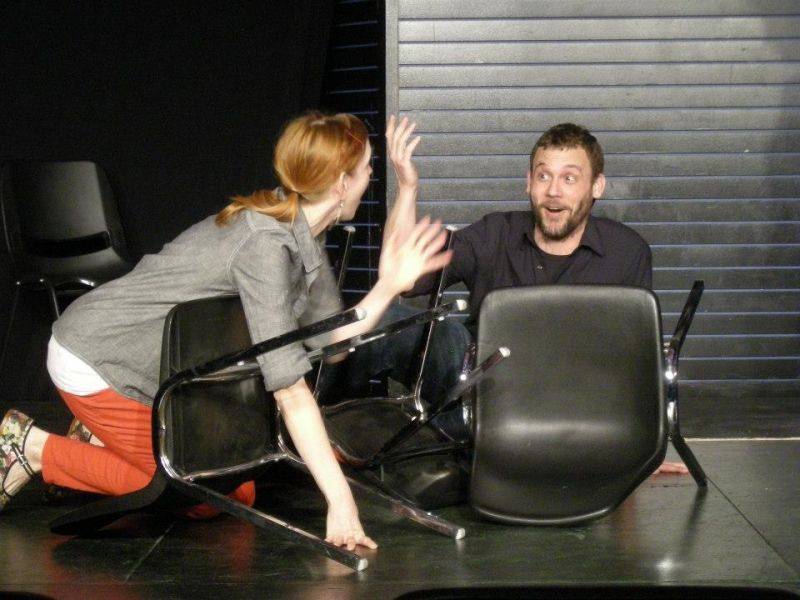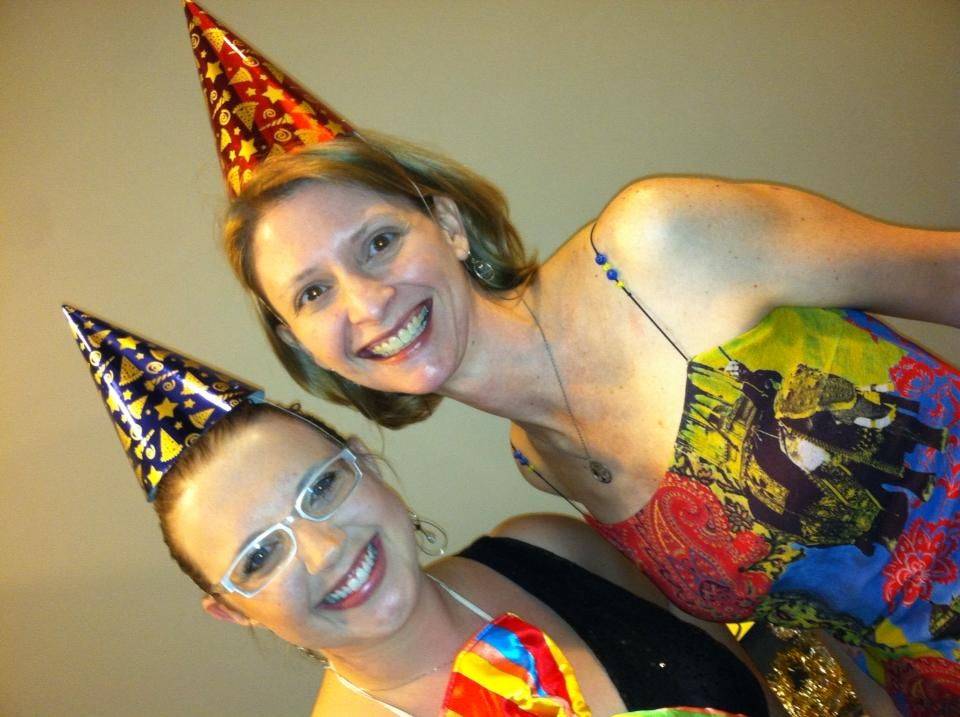I have a deep and unwavering respect for women who don’t give two shits about looking pretty on stage. Gilda Radner, Melissa McCarthy, and Catherine O’Hara come to mind. Women of this comedic caliber will go for the jugular, and the laugh, every single time. They use our expectations about women to make you crack up.
Locally, Aubrey Wachtel is fully in charge of disregarding “femininity” for the sake of a laugh. I have seen her morph into animals, men, aliens…whatever the situation calls for. She gives absolutely no fucks about being cute for you. You will laugh because she knows where the funny is. She’ll show it to you.

Smile Politely: When did you start doing improv on a regular basis?
Aubrey Wachtel: In the spring of 2005, I started attending weekly improv rehearsals with Zoo Improv and have been attending rehearsals and performing ever since. Several of the current members of Zoo Improv started improvising together around that time: myself and my husband, James; Cara Maurizi, Brian Hagy, and Eric Beckley. We consider spring of 2005 to be the start of the group as we know it today, so we just celebrated our ninth anniversary. I performed with Zoo at monthly shows for several years at a variety of venues around town. Then, in November of 2012, Zoo Improv started hosting the Friday Night Improv shows at SoDo Theatre (111 S. Walnut St., Champaign). I’ve never been able to bring myself to take a break or go on hiatus. I just love it too much.
SP: How did the idea come to you? Had you done improv before?
Wachtel: A friend of ours was coordinating the existing group and their rehearsals. He invited us (James and me) to come check it out. I’m pretty sure the conversation included the phrase that is ubiquitous in any conversation that involves introducing someone to improv. (“You know, like in Whose Line Is It Anyway?‘”)
Other than playing a couple games, like Freeze Tag, in high school drama club, I had really never done any improvisational acting at all. I participated in Speech Team during those years doing comedic duet performances. I remember learning that there was an improv comedy group category that some students were competing in. The idea of having to make it all up was pretty scary to me then. Now what scares me is the idea of having to memorize lines.
SP: People are so scared of improvising, but we do it every day…
Wachtel: I’m sure there’s a bunch of psychology analysis that could be done about what makes the thought of improvising so scary for some people. I’ve been teaching beginning and intermediate level improv classes during the last couple of years. It’s been interesting to see the variety of people that come and the reasons they have for signing up. I used to try to make the point to students that were really worried about having to make things up that we are improvising all day, every day. But I’ve learned that some people really aren’t. Some people are using habit and muscle memory to get through every day. These are the folks that really can’t handle change. I feel like these are the people that could benefit from experiencing some improv training the most.
SP: True. People are generally on autopilot. How has the group changed in the 9 years you’ve been with Zoo?
Wachtel: It’s difficult to sum up how Zoo Improv has changed over the years. There’s been a lot of growth in a variety of ways. We’ve had, I would say, about twenty members come and go over the years. When we started out, we had a mixture of people with prior experience and total beginners. People with formal theater training, amateurs, and totally fresh beginners including teenagers and adults.
Today we’re an all adult group. We had some strong individuals as leaders early on but, as they moved on, we have done a nice job of functioning as a committee. In the spring of 2008 we applied to the Chicago Improv Festival and were accepted as an apprentice team. The creative directors there matched us with an amazing coach, Jet Eveleth, who provided us with several hours of training as a team. The apprentice team experience was formative for us. During that same year we were getting enough commissioned work that the income was enough for us to decide we would apply to incorporate as a non-profit organization. That required us to have a mission statement and by-laws and I feel like that’s when our goals really had to materialize. With encouragement from Jonathan Pitts, executive director of Chicago Improv Productions, we started producing the C-U Improv festival, which includes performances and workshops by some amazing improvisers each year. (I’m sure that everyone in our group would want me to give special mention of Jay Sukow. He has provided our team with several training sessions that I just cannot measure the value of.) We were fortunate to be invited to come perform monthly in SoDo Theatre by Natalie Ellis while Class Act Interactive Education and Events was the primary business in the space. Today, we rent from Christ Community three nights a week for our own rehearsals, to provide classes on Thursday nights and shows every Friday night. We have hosted local performing teams as well as teams that traveled from Chicago, Indianapolis, Moline, Kansas City, and New Orleans.

Wachtel: I’m… feeling like it sounds so serious, somehow. And, I guess that, for me, I do take bringing to the community and making improv shows and classes available to people seriously. But only because it’s fun. Improv is really, really fun. We all love it and our love and appreciation of it have really expanded over the years. Our ideas of what improv should look like and what good scene work is have been informed by lots of great coaches and many hours studying, reading, watching, and practicing. We have gone from a group of people just looking for a chance to improvise to a group of people looking to make improv experiences available to anyone in the community.
SP: Any particularly awesome/horrible shows or audience moments come from that sharing?
Wachtel: Just this last Sunday, we were performing a children’s show at a birthday party. It was a party of mostly 8-year old boys. We take volunteers for interactive improvised scenes that we do with them. A tiny little girl volunteered but didn’t get picked early on, so I told her I would be sure to bring her up on stage later for another game. When I finally did, and it was her turn to talk, she froze, then started crying and ran off the stage to go cry on her mother’s lap. I think she may have cried to the end of the performance. Now, in my brain, I have this image of her in her mid-twenties at a therapist working through how improv traumatized her as a child.
On the awesome side of things: At our anniversary celebration each year in May we do a special type of improv jam where anyone that wants to can throw their name in the hat. We randomly draw names to form special impromptu teams that then improvise a set for about 20 minutes together. This is one of my favorite things we do because anyone, trained improviser or not, can get up on the stage and play. It’s so much fun to see the amazing scene work that some of these first timers can produce. I love it!
SP: When you teach a single improv class, what things do you focus on?
Wachtel: We try to tailor commissioned workshops to the needs of the group requesting. During the month of May, and between regular sessions throughout the year, we’ll offer targeted classes that focus on particular content like creating characters, object work, finding inspiration in different ways, etc. If I have only two or three hours with one group for one class, and they are mainly beginners, then I’ll focus on exercises and principles that support students in making statements (avoiding questions), agreeing to their scene partners offers (saying, “Yes”), and heightening the content of the scene (adding specificity). I have been blown away by some of the scene work that has been created when the students are really grasping these three principles.

Zoo Improv members Cara Maurizi and James Wachtel
Wachtel: I also encourage participants to take advantage of the fact that, in improv, you have everything you need, can be anywhere the scene needs you to be, and you can be an expert in anything and everything. The only mistake in improv is treating something like it’s a mistake. This lends itself to an “out of the box” kind of thinking that can be liberating for some people. For some first time improvisers, you can watch a switch flip in their minds during the course of the class. I always hope people take that feeling with them.
SP: So you are just CONSTANTLY bombarded with the metaphor. Because it’s a strong one.
See Zoo Improv every Friday at SoDo Theatre in downtown Champaign, just around either corner from Indi Go Artist Co-op.
Top Photo: Aubrey Wachtel (right) with fellow improvisor Lauren Barnes at Zoo Improv’s birthday bash.








